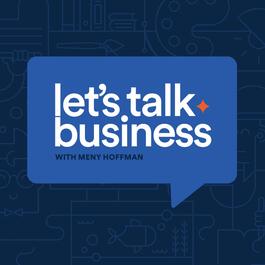
Delivering Promises and Elevate Business Credibility with Gerry O’Brion
In today's rerun episode of Let's Talk Business, we're excited to bring back an insightful conversation with a marketing legend who has helped generate billions in revenue for major brands. Join our host, Meny Hoffman, as he sits down with Gerry O’Brion—author, speaker, and advisor—to delve into the powerful strategies and insights that have shaped Gerry's remarkable career. Gerry has worked with household names like Procter & Gamble, Coors Lite, and Red Robin. He is known for his innovative marketing concepts, such as the color-changing mountains on Coors Lite bottles. In this episode, Gerry shares his expertise on how small businesses can stand out in competitive markets without massive marketing budgets. Gerry O'Brion emphasizes the power of word-of-mouth referrals and decreased training times by specializing in specific areas, such as Volkswagen car repairs. He explains that small businesses can learn from large brands by listening to and gathering insights from customers to understand their choices and preferences. A significant challenge in influencing customer decisions lies in external factors and the credibility of a company's claims. Gerry highlights the necessity of providing proof for business promises—referred to as the "because" factor—which helps differentiate a company from its competition and assures customers they're making the right choice. O’Brion promotes his book "They Buy Your Because," offering additional resources through his website, and underscores the value of consistent brand messaging across all platforms. He also discusses the role of inspirational "why" messages internally while stressing the importance of clear and unique value propositions in customer-facing communications. Key insights include the need for small businesses to identify unique aspects of their offerings, ask why existing customers choose them over the competition, and tailor their approach to varied sales scenarios. These strategies, coupled with understanding customer mindsets and problems, enhance a small business’s ability to succeed in a crowded market. 00:04:51 - Focus efforts, refine niche, demonstrate unique value. 00:09:25 - Proof distinguishes your promise from marketing fluff. 00:12:45 - Helping businesses find their "because" for differentiation. 00:14:22 - What makes your business exceptional? List specifics. 00:17:01 - Strategically structure website for effective visitor engagement. 00:22:43 - Varied outreach methods tailored to listener's company. 00:26:06 - Innovative weed control additive for resistant pests. 00:28:47 - Understand and address decision maker's real concerns. 00:30:51 - Optimize messaging sequence based on consumer insights. 00:34:30 - Narrow your focus to grow faster financially. 00:38:50 - Ensure audience targeting, understanding, outcomes, and credibility. 00:42:42 - Identify clients, unique value, and effective persuasion. 00:43:44 - Focus on delivering a unique, authentic because. The first question a business owner needs to ask is, Where do my current clients come from - and where can I find more like them? Many times, the answer is in small niches where people already value what you offer. That means that the next question you need to ask is, What does your business bring to the table that the bigger competitor doesn’t bring or can’t bring? And the third question which follows is, What is the most effective way of convincing those potential clients that you offer something that bigger companies do not? The biggest mistake that companies make when it comes to marketing, is making promises without also giving the “Because” - meaning, the reason that you will be able to keep your promise. Promises without a “because” sound like empty marketing fluff. Promises with a “because” offer a compelling reason for a potential client to choose you instead of someone else. The following exercise is very important: Write down, “You should buy from us instead of from our competitors because- “ and complete the sentence with your authentic answer. If your answer sounds the same as any of your competitors, you’re just adding to your customers’ confusion, when they actually want certainty that they’re making the right decision. So think long and hard about the “because” that will make your business unique while remaining true to what you can actually do. Many people confuse their “Because” with their “Why” - and that’s a big mistake. Your “Why” is the reason that you do what you do, and is a type of mission statement that can inspire you and your employees. But when you’re selling something and a customer is about to give you money, he doesn’t care about your “Why”; he cares about your “Because” - meaning, what you do differently from everyone else, and how you can deliver that unique aspect to your client. When you talk about your “Because,” you are giving your client the certainty that buying from you is the right choice. The main thing that big companies do better than small companies is listening and learning from their customers. Understanding the mindset of the people you serve is the foundation of all influence. So act like the big companies, and learn to ask questions. Make surveys. Go to the people who chose your competitor instead of you and ask them why they made that decision. Getting this information will help you better focus on how to close the next sale. Gerry Website Linkedin They Buy Your Because Panda Doc
From "Let's Talk Business"


Comments
Add comment Feedback